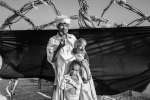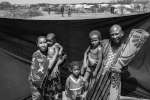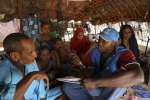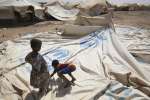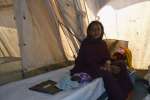More people flee to Mauritania to escape insecurity in northern Mali
News Stories, 20 July 2015
MBERA CAMP, Mauritania, July 20 (UNHCR) – Almost 400 people fleeing a renewed outbreak of fighting in northern Mali have sought refuge in Mauritania over the last few months.
Most of the newcomers seeking asylum come from the Nampala area. Since the beginning of the conflict in 2012, largely between Tuareg MNLA fighters and government forces, the inhabitants of this area have often been caught in the crossfire.
"Fear led us to leave," explained Aminata, one of the new arrivals. "We travelled to Fassala – which is the official entry point for Malian refugees into Mauritania – in a small truck with other families from the area".
Upon arriving at Fassala, Aminata, a mother in her late-20s, and her family received assistance from the Mauritanian authorities who contacted UNHCR. After careful pre-screening of the population to identify individuals with specific needs, the UN refugee agency arranged for their onward transport to Mbera Camp.
"In the camp, we received shelter, food, water, kitchen utensils and sleeping mats" added Aminata.
Much of the territory of northern Mali is claimed by different rebel groups. Lately, the area has seen a new upsurge in fighting.
UNHCR figures show that the number of new arrivals since end of April is now 395, though others who have not yet been registered may also have arrived.
Mbera camp is located 50 km from the Malian border. During the day temperatures reach 45 degrees Celsius. However, as the sun slowly begins to descend, children take over the dusty streets, playing with wooden sticks and makeshift soccer balls.
The camp, which was built in June 2012, is now home to almost 50,000 Malian refugees who have access to key services such as education, health, water and sanitation, shelter and energy.
They are provided with monthly food rations and relief items such as sleeping mats, buckets and kitchen utensils. In addition, UNHCR and its partners carry out various programmes such as vocational training and literacy classes, provide support to the refugees' small businesses and facilitate access to gardening activities to strengthen their self-reliance.
By Sebastien Barrit Laroze









